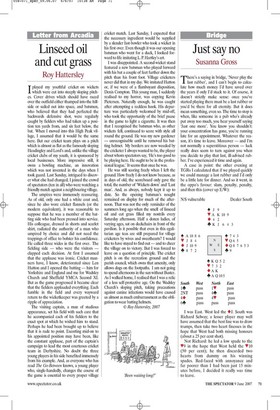Linseed oil and cut grass Roy Hattersley T played
Linseed oil and cut grass Roy Hattersley T played my youthful cricket on wickets 1 which were cut into steeply sloping pitches. Cover drives which should have raced over the outfield either thumped into the hillside or sailed out into space, and batsmen, who believed that they had perfected the backwards defensive shot, were regularly caught by fielders who had taken up a position ten yards from, and six feet below, the bat. When I moved into this High Peak village, I assumed that it would be the same here. But our cricket team plays on a pitch which is almost as flat as the famously sloping Headingley and Lord's and, unlike the village cricket clubs of my youth, it is sponsored by local businesses. More impressive still, it owns a bowling machine, an innovation which was not invented in the days when I took guard. Last Sunday, intrigued to discover what else had changed, I joined the crowd of spectators (ten in all) who were watching a friendly match against a neighbouring village.
The umpires were immensely reassuring. As of old, only one had a white coat and, since he also wore cricket flannels (or the modern equivalent), it was reasonable to suppose that he was a member of the batting side who had been pressed into service. His colleague, dressed in shorts and scarlet shirt, radiated the authority of a man who umpired by choice and did not need the trappings of office to bolster his confidence. He called three wides in the first over. The fielding side — who were the visitors — clapped each decision. At first I assumed that the applause was ironic. Cricket manners have, I know, deteriorated since Len Hutton and I opened the batting — him for Yorkshire and England and me for Wadsley Church and Sheffield YMCA Second XI. But as the game progressed it became clear that the fielders applauded everything. Each fumble in the field and every wayward return to the wicketkeeper was greeted by a ripple of appreciation.
The visiting captain, a man of studious appearance, set his field with such care that he accompanied each of his fielders to the exact spot at which he wished him to stand. Perhaps he had been brought up to believe that it is rude to point. Escorting mid-on to his appointed position may have been, like the constant applause, part of the captain's campaign to lead the most courteous cricket team in Derbyshire. No doubt the three young players in his side benefited immensely from his example. And, as everyone who has read The Go-Between knows, a young player who, single-handedly, changes the course of the game is essential to every proper village cricket match. Last Sunday, I expected that the necessary ingredient would be supplied by a slender fast-bowler who took a wicket in his first over. Even though it was our opening batsman who went for a duck, I looked forward to life imitating L. P. Hartley's art.
I was disappointed. A second-wicket stand featured a new batsman who played forward with his bat a couple of feet further down the pitch than his front foot. Village cricketers never did that in my day. We imitated Hutton or, if we were of a flamboyant disposition, Denis Compton. This young man, I suddenly realised to my horror, was copying Kevin Pietersen. Naturally enough, he was caught after attempting a reckless hook. His departure was particularly welcomed by mid-oft who took the opportunity of the brief pause in the game to light a cigarette. It was then that I recognised the batsman who, as other wickets fell, continued to score with style all round the ground. He was my new gardener — unrecognisable until he removed his batting helmet. My borders are now weeded by the cricketer I always wanted to be, the player about whom spectators say, 'He's too good to be playing here. He ought to be in the professional league.' It seems that once he was.
He was still scoring freely when I left the ground. How freely I do not know because, as in days of old, the scoreboard only gave the total, the number of 'Wickets down' and 'Last man'. And, as always, nobody kept it up to date. So the opening batsman's nought remained on display for much of the afternoon. That was not the only reminder of the summers long ago when the smell of linseed oil and cut grass filled my nostrils every Saturday afternoon. Half a dozen ladies, of varying ages, sat on deckchairs in front of the pavilion. Is it possible that even in this egalitarian age teas are still prepared for village cricketers by wives and sweethearts? I would like to have stayed to find out — and to cheer the village on to victory. But I was forced to leave on a question of principle. The cricket pitch is on the recreation ground and the parish council, which owns that amenity, only allows dogs on the footpaths. I am not going to spend afternoons in the sun without Buster. As I walked home, I realised that I was a relic of a less self-protective age. On the Wadsley Church's sloping pitch, taking precautions against canine infections would have caused us almost as much embarrassment as the obligation to wear batting helmets.
Roy Hattersley, 2007




























































 Previous page
Previous page